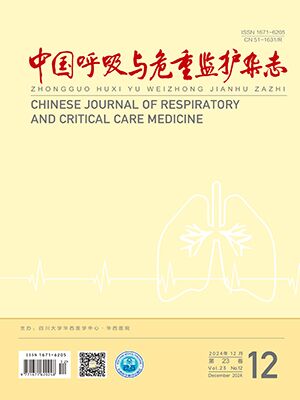| 1. |
中国医师协会血液科医师分会, 中华医学会血液学分会. 嵌合抗原受体T细胞治疗多发性骨髓瘤中国血液临床专家共识(2022年版). 中华血液学杂志, 2022, 43(4): 265-271.
|
| 2. |
Xiao XY, Huang SK, Chen SF, et al. Mechanisms of cytokine release syndrome and neurotoxicity of CAR T-cell therapy and associated prevention and management strategies. J Exp Clin Cancer Res, 2021, 40(1): 367.
|
| 3. |
宋凤美, 胡永仙, 张明明, 等. 人源化靶向CD19 CAR-T细胞治疗复发/难治急性B淋巴细胞白血病的有效性及安全性. 中华血液学杂志, 2022, 43(8): 651-656.
|
| 4. |
Morgan RA, Yang JC, Kitano M, et al. Case report of a serious adverse event following the administration of T cells transduced with a chimeric antigen receptor recognizing ERBB2. Mol Ther, 2010, 18(4): 843-851.
|
| 5. |
Liu HP, Ma YX, Yang CP, et al. Severe delayed pulmonary toxicity following PD-L1-specific CAR-T cell therapy for non-small cell lung cancer. Clin Transl Immunology, 2020, 9(10): e1154.
|
| 6. |
Chen HL, Wang FX, Zhang PY, et al. Management of cytokine release syndrome related to CAR-T cell therapy. Front Med, 2019, 13(5): 610-617.
|
| 7. |
Bottari G, Merli P, Guzzo I, et al. Multimodal therapeutic approach of cytokine release syndrome developing in a child given chimeric antigen receptor-modified T cell infusion. Crit Care Explor, 2020, 2(1): e0071.
|
| 8. |
张智金, 谭细琼. 1例急性B淋巴细胞白血病嵌合抗原受体T细胞免疫疗法治疗后严重细胞因子释放综合征的护理. 当代护士(中旬刊), 2019, 26(29): 130-132.
|
| 9. |
宁跃爽. CD123嵌合抗原受体T细胞治疗复发难治急性髓系白血病(MDS转化)1例并文献复习. 河北: 河北医科大学, 2019.
|
| 10. |
Lee DW, Santomasso BD, Locke FL, et al. ASTCT consensus grading for cytokine release syndrome and neurologic toxicity associated with immune effector cells. Biol Blood Marrow Transplant, 2019, 25(4): 625-638.
|
| 11. |
Liu DL, Zhao JJ. Cytokine release syndrome: grading, modeling, and new therapy. J Hematol Oncol, 2018, 11(1): 121.
|
| 12. |
Maude SL, Laetsch TW, Buechner J, et al. Tisagenlecleucel in children and young adults with B-cell lymphoblastic leukemia. N Engl J Med, 2018, 378(5): 439-448.
|
| 13. |
Frey NV, Shaw PA, Hexner EO, et al. Optimizing chimeric antigen receptor T-cell therapy for adults with acute lymphoblastic leukemia. J Clin Oncol, 2020, 38(5): 415-422.
|
| 14. |
Chen PX, Tang Y, He WX, et al. Potential pathophysiological mechanisms underlying multiple organ dysfunction in cytokine release syndrome. Mediators Inflamm, 2022, 2022: 7137900.
|
| 15. |
Neelapu SS, Tummala S, Kebriaei P, et al. Chimeric antigen receptor T-cell therapy - assessment and management of toxicities. Nat Rev Clin Oncol, 2018, 15(1): 47-62.
|
| 16. |
Diorio C, Shaw PA, Pequignot E, et al. Diagnostic biomarkers to differentiate sepsis from cytokine release syndrome in critically ill children. Blood Adv, 2020, 4(20): 5174-5183.
|
| 17. |
Athale J, Busch LM, O'Grady NP. Cytokine release syndrome and sepsis: analogous clinical syndromes with distinct causes and challenges in management. Infect Dis Clin North Am, 2022, 36(4): 735-748.
|
| 18. |
Yan ZL, Zhang HX, Cao J, et al. Characteristics and risk factors of cytokine release syndrome in chimeric antigen receptor T cell treatment. Front Immunol, 2021, 12: 611366.
|
| 19. |
Li D, Que YM, Ding SN, et al. Anti-BCMA CAR-T cells therapy for a patient with extremely high membrane BCMA expression: a case report. J Immunother Cancer, 2022, 10(9): e005403.
|
| 20. |
Fitzgerald JC, Weiss SL, Maude SL, et al. Cytokine release syndrome after chimeric antigen receptor T cell therapy for acute lymphoblastic leukemia. Crit Care Med, 2017, 45(2): e124-e131.
|
| 21. |
Davila ML, Riviere I, Wang XY, et al. Efficacy and toxicity management of 19-28z CAR T cell therapy in B cell acute lymphoblastic leukemia. Sci Transl Med, 2014, 6(224): 224ra225.
|
| 22. |
Pan J, Deng BP, Ling ZJ, et al. Ruxolitinib mitigates steroid-refractory CRS during CAR T therapy. J Cell Mol Med, 2021, 25(2): 1089-1099.
|
| 23. |
Moriyama K, Nishida O. Targeting cytokines, pathogen-associated molecular patterns, and damage-associated molecular patterns in sepsis via blood purification. Int J Mol Sci, 2021, 22(16): 8882.
|
| 24. |
田兴国, 陈志, 贺慧为, 等. 多黏菌素B血液灌流对脓毒症和脓毒症休克患者预后影响的荟萃分析. 中国呼吸与危重监护杂志, 2020, 19(1): 16-21.
|
| 25. |
中国研究型医院学会危重医学专业委员会, 中国医药教育协会重症医学专业委员会. 西维来司他钠临床应用专家共识. 中国研究型医院, 2022, 9(1): 9-13.
|




